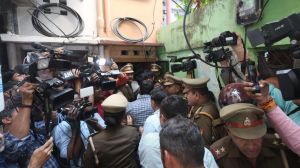‘What if she had been my daughter’: Emotional scenes in Madras HC as judge orders removal of woman advocate’s images circulating online
Justice N Anand Venkatesh directed the ministry to detect, block and remove the images and videos within 48 hours, and sought a compliance report by July 14.
 The court suo motu impleaded the Director General of Police (DGP) as a respondent and called for directions to be issued to all stakeholders, stating that the issue demanded systemic reform to protect women from similar trauma. (Source: File)
The court suo motu impleaded the Director General of Police (DGP) as a respondent and called for directions to be issued to all stakeholders, stating that the issue demanded systemic reform to protect women from similar trauma. (Source: File)Amid emotional courtroom scenes, the Madras High Court Wednesday ordered the Union Ministry of Electronics and Information Technology to take immediate steps to remove private, non-consensual images and videos of a woman advocate that had been circulating online.
The material, allegedly recorded without her knowledge by a former partner, was shared across pornographic websites, messaging apps and social media platforms.
Justice N Anand Venkatesh directed the ministry to detect, block and remove the images and videos within 48 hours, and sought a compliance report by July 14.
“The woman is undergoing great mental agony,” the judge observed, noting the viral spread and repeated re-uploading of the content.
The court also suo motu impleaded the Director General of Police (DGP) as a respondent and called for directions to be issued to all stakeholders, stating that the issue demanded systemic reform to protect women from similar trauma.
“I was just thinking, what if this woman lawyer had been my daughter,” Justice Venkatesh said in open court, his voice choking. He said he intended to meet the petitioner in his chambers to offer words of support, admitting that he would have to “prepare himself” not to break down.
According to the lawyer’s affidavit, her partner from her college days had secretly recorded their intimate moments. Years later, the images and videos began circulating online.
She filed a police complaint on April 1, naming the former partner and a WhatsApp group administrator. But she later found out that the content continued to spread with no apparent intervention from either law enforcement or the ministry.
On June 18, she submitted a formal representation to the Union IT Ministry, urging it to employ all available technological tools — hash-matching, AI-based content detection, PhotoDNA, and Google content safety hash checkers — to take down the content.
Despite the existence of precedent — including a detailed order passed by the Delhi High Court in April 2023 — the ministry failed to act swiftly, argued senior counsel Abudu Kumar Rajarathinam.
“We have created Frankenstein-like monsters called the internet and social media without first putting in place a mechanism to prevent our women from facing such trauma,” he said during the hearing.
He also urged the court to direct the Tamil Nadu Police to coordinate with the Union IT Ministry and act immediately upon receiving such complaints.
Justice Venkatesh noted that the petitioner’s resilience came from her legal training and support system. “Fortunately, she is in this profession and she has the help of all of us here,” he said. “What happens to some silent sufferers who cannot gather the courage to fight?”
He underscored the constitutional duty of the State and the courts to uphold every individual’s fundamental right to dignity.
The court directed the DGP to ensure awareness among police officers and establish effective coordination with the ministry so that such content is removed promptly upon the registration of criminal complaints. The judge also said he would keep the writ petition pending to issue further directions, aimed at establishing long-term safeguards.







